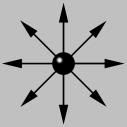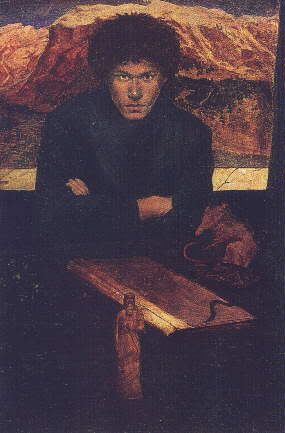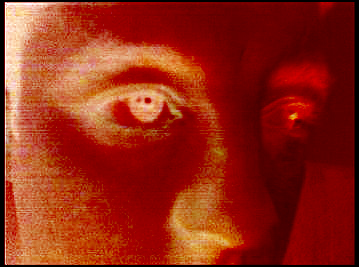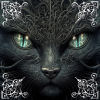Chaos in Magick
By STABB666
Chaos Magick is a newer form of expression upon ‘standard’ models of arcane workings, but one which has its fundamental principles in the very beginnings of the traditions.
The present day understandings on the application of Chaos to Magick, were developed in the main by Austin Osman Spare in the first half of the twentieth century, it later gave birth to such movements as Discordianism and myriad of other interpretations.
The fantasy writer Michael Moorcock popularised one of the most recognisable images now associated with Chaos, that of the Eight Pointed Star, which remains today the most iconic of the subject.

The Theory
The use of Chaos in Magickal invocation is one which is difficult to define as a set of rules and standards, as there are few binding laws. For this reason, it is an intensely personal form, one which is as unique in each of its diverse forms as those who practice it.
Christopher Bray, in “The Collected Works of Austin Osman Spare”, says that;
"Chaos is the universal potential of creative force, which is constantly engaged in trying to seep through the cracks of our personal and collective realities. It is the power of Evolution and Devolution.
"Shamanism is innate within every one of us and can be tapped if we qualify by adjusting our perception and attitude and making our being ready to accept the spontaneous. Achieving Gnosis, or hitting the `angle of departure of consciousness and time', is a knack rather than a skill."
What is meant by this, is that the true Chaote selects Paradigms which are appropriate for the moment, discarding them as easily as a snake would it’s skin and then, moving on to the next set of information. Always seeking to develop further understanding, to refine the knowledge and seek not to be trapped by order-bound realities. Thus creating a unique system of Magick, individual to one’s own choices of interest and desire.
The purpose of the rejection of rules and probability by Spare was two-fold. The first reasoning that one’s Magicks should not be limited by other, more predictable outcomes, which are ultimately doomed to failure, based on an inability of rigid forms to adapt to unexpected change. The second, was because Spare believed that allowing the mind to utilise coincidence and opportunity, is the only means of assuring total success in any endeavour.
The Self
Another of Spare’s works, is the ‘Book of Pleasure’, otherwise known as ‘The Psychology of Ecstacy’, a precursor to the Zos Kia Cultus, wherein he examines techniques for achieving a heightened state of awareness through gratification of the self. In this book, he summarises:
“Self-Love: A mental state, mood or condition caused by the emotion of laughter becoming the principle that allows the Ego appreciation or universal association in permitting inclusion before conception.”
In this state, the mind rejects all doctrines as unnecessary determinations of what is and seeks to define the pure essence of one’s being in a non-corrupted form, which Spare named ‘Kia’. Kia being the ultimate expression of the ‘I’. The un-molested purity, the aspect of thought which transcends conception and meaning in words. Beyond the ability for the mind to know its true nature, it remains un-nameable, un-fathomed by all, otherwise it cannot be the eternal which is. Conceived ideas are a denial of the Kia, where the ideas of Godhead are applied within our selves to this Kia, they are only then reflected back unto ourselves, determining our eventual and essential ‘Self’.
That we imitate the image which we supplant upon Kia as the Godhead, is the pleasing of ones self through recognition of it. Please yourself. Or as Crowley puts it, “Do what Thou Wilt shall be the whole of the Law.” One can only know thyself by learning the truth of the self.
The Sigils
The premise of creating a Sigil is one of imbuing the icon with the energy of the Magick being invoked. Once the conceptual thoughts are released into this form, it is dismissed from the forethought of the conscious mind and instead, allowed to flow into the subconscious, wherefrom to guide the necessary actions upon reality, creating the condition for the Magick to complete its desired effect.
Spare felt that genius was a measure of the subconscious ability to affect reality. Where the Ego is unavailable to determine ambition, so now evolution and unconscious desire exert their influence over action. As the bird is want to spread wings and fly, so too do the sigils informed to the subconscious.
The use of ceremony and ritualistic practice, which Spare saw as deceptions for the self and shrouds of ignorance, is arbitrary to the choice of whether one pleases oneself by performing such acts. As any act which is performed ought to be one of self-pleasure, for in there lay’s the secret of success. That the unknowable I indebts the conscious self to seek supplication for its need. The need is driven by the Sigil of the desired Magickal effect. And so, buy allowing the Kia to be know the pleasure in satisfaction, achieve the sense of accomplishment which was sought.
By placing the Sigil within the Kia, avoiding the corruption of Ego, it is given free passage to success. What is most required is a specific of intent, a precision of thought, in relation to the result. In creating the sigil, one must choose the words which represent the desire. For example, Spare explains it thus;
“Now, if for some purpose, you wanted the strength of a tiger, you would make a sentence such as:-
"This my wish (will) to obtain the strength of a tiger.”
Sigilised this would be:-
This my wish (illustrative example of this part of the sentence)
To obtain (ditto)
The strength of a Tiger (same as said above)
Combined as one Sigil (example) or (more simplified example).”
Although, in teaching the nature of Sigils, spare felt that he may be devaluing or somehow tainting the images of others by his descriptive work, feeling instead that each should be capable of forming one’s own Structure of Sigils.
Spare goes on to say;
“Now, by virtue of this Sigil you are able to send your desire into the subconsciousness (which contains all strength); that having happened, it is the desire's realization by the manifestation of the knowledge or power necessary.
First, all consciousness except of the Sigil has to be annulled; do not confuse this with concentration- you simply conceive the Sigil any moment you begin to think. Vacuity is obtained by exhausting the mind and body by some means or another [Spares personal choice was exertion through sex]. A personal or traditional means serves equally well, depending on temperament; choose the most pleasant; these should be held in favour, Mantras and Posture, Women and Wine, Tennis, and the playing of Patience, or by walking and concentration on the Sigil, etc., etc. None is necessary to him who has (even symbolically) for a moment conquered the dual principle (Conception)- his Ego is free from gravity.
If the Sigil is made an obsession by continual apprehension, its realization may happen at any moment, in the form of inspiration. This is done by reverting the mind to the Sigil when one is extremely worried- the time of exhaustion is the time of fulfilment. At the time of exhaustion or vacuity, retain only and visualize the Sigil form- eventually it becomes vague, then vanishes and success is assured. By the Ego conceiving only the Sigil, and not being able to conceive anything from it, all energy is focussed through it, the desire for identification carries it to the corresponding sub-conscious stratum, its destination.
The Sigil being a vehicle, serves the purpose of protecting consciousness from the direct manifestation of the [consciously unacknowledged] obsession, conflict is avoided with any incompatible ideas and neither gains separate personality. It [obsession] is either gradually assimilated and becomes organic or returns to its original abode, its purpose of illumination served. Hence the mind, by Sigils, depending upon the intensity of desire, is illuminated or obsessed from that particular Karma relative to the desire, but not from memory or experience which was recent. Knowledge is obtained by the sensation, resulting from the unity of the desire and Karma. Power, by its "actual" vitalization and resurrection. “
In this we find the formula for true Chaos Magick.
The Man
 Spare was a man gifted to genius. Raised in Victorian England, he was a noted artist, self-confessed witch and intensely perceptive. He published his first works on Magick at a young age, catching the attention of the infamous Aleister Crowley. Spare was a man gifted to genius. Raised in Victorian England, he was a noted artist, self-confessed witch and intensely perceptive. He published his first works on Magick at a young age, catching the attention of the infamous Aleister Crowley.
They formed a brief and productive relationship, in that Spare was at one stage considered for induction into the “Hermetic Order of the Golden Dawn”, Crowley’s own Branch of the Ordo Tempi Orientis. However, fundamental disagreements of the way in which Crowley had constructed his system and integrated into it the strictures of numerous ancient traditions. Spare felt that it was unable to properly evolve as a true form of Chaos Magick whilst limited in such a manner.
Alistair Livingston (pseudonym) of the OTO states: “Thelema, as developed by Crowley into a form suitable for the 20th century, contains a whole heritage of experience and practice which reaches back through the Golden Dawn through Hermeticism to Egypt and Sumeria, which in turn drew on the beliefs of our nameless ancestors who struggled to create models of the world, cosmologies and creation myths within which to make sense of their being in the world.”
Spare then published in 1921, “The Focus of Life”, a detailed summation of his work to date, combining intricate visual imagery with written text, so as to better convey the grasping thoughts which he struggled to find language for. It is for this reason that he went on to create the Sigilisation process for his thoughts to compliment the words.
In later years, he tended towards isolating himself from all around him, preferring a reclusive environment of free thought. The “Zos Kia Cultus” works were generally felt to be the pinnacle of his achievements in the occult field. Bringing together in 1954, all of the personalised ways of expression which he had refined through the years of solitude, including the wealth of knowledge on witchcraft garnered from his Coven membership.
(Austin Osman Spare (1886-1956))
~
References
The Magickal Revival
Cults of the shadow
by Kenneth Grant
The Grimoire of Chaos Magick
by Julian Wilde
Selected works of Michael W. Ford
Selected works of Austin Osman Spare
Selected works of Aleister Crowley
|





 Spare was a man gifted to genius. Raised in Victorian England, he was a noted artist, self-confessed witch and intensely perceptive. He published his first works on Magick at a young age, catching the attention of the infamous Aleister Crowley.
Spare was a man gifted to genius. Raised in Victorian England, he was a noted artist, self-confessed witch and intensely perceptive. He published his first works on Magick at a young age, catching the attention of the infamous Aleister Crowley. 





